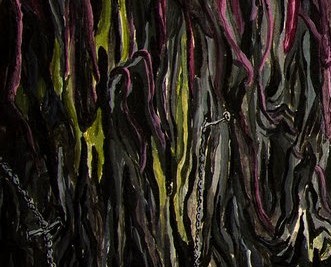The CIA really needs to come up with better ways to infiltrate the pro-palestinian movement cause this ain’t working
Italians?
Nooooo….how heckin’ DARE you! White people are literally perfect and people who are literally perfect have no agency! It’s da jooz! It’s da jooz!
(Don’t ask what ethnicity Jesus or the Apostles were.)
Ayyyyy, this-ah Jewish guy is-ah telling da people to share-ah their Stromboli!
Mama mia! We-ah gotta nail him to ah tree for dat! Boopity boopity!
What’s wrong with Xtians?
Politically motivated miseducation that ultimately derives from the ruling class.
Thankfully, there have also been many heroic Christians: self‐sacrifice is, I would argue, the noblest of all themes associated with Christianity, and there have been some Christians who recognised that and put it into practice.
My favourite example was when the burghers of Regensburg gave their Jewish neighbours insincere baptisms to save them from violence (albeit violence from other self‐identified Christians, but still). Admittedly the New Testament might not have directly influenced their choice to be saviours, but I’d argue that they still demonstrated better Christian behaviour (and certainly better human behavior) than many Christians who adopt their faith simply for cultural or political reasons.
deleted by creator
Works for me
never underestimate the evils of the Penisulars
Fascist freak, every single Lebanese person facing down the Zionist invasion right now, and every single Jew in the world, are worth 500x this sweaty groyper.
At least the black hammers were funny. This guy is just corporate boring
That’s why they’re called white hammer
Jesus would not want you to care that the people who stole his homeland from its occupants, 2000 years after his death, have the same religious symbol on their genocide flag of the people who “killed him”
But also wasnt the whole point him dying? Thats how our sins are forgiven right? We should be thanking the Jews for bringing about substitutionary atonement then.
Fucking idiotic Amerikkkan Christians dont even understand their own christology
That’s not even right either. Jesus died because of everybody’s sins, retroactively weighed down in the cross by the burden of all of humanity’s sins, past and future. The Jews didn’t kill Jesus. The Romans didn’t kill Jesus. Literally every single person who has ever breathed killed Jesus, that’s the whole point! He didn’t carry the sins of the people who were there condemning Him to die at the cross, He was carrying every sin ever committed!
Yes he literally died for all mankind and he knew it and did it willingly even though he was scared of being tortured to death because he was a human being. That’s it. That’s the business. American Christians are so fucking weird about it.
If I knew everybody was set forever, I bet I could do that shit too.
Call me pedantic, but his death was a self‐sacrifice; nobody really ‘killed’ him.
Including the sin of…whatever the bible calls what this ghoul is doing.
Yeah, the traditional Jewish form of execution,
checks notes
crucifixion
How did the Jews kill Jesus i thought it was a mf named Pontius
deleted by creator
So, Matthew is speaking to Jewish Chistians and is absolutely attempting to focus the main blame on the Jewish people, partially as an attempt to fulfil prophecy and partially because the response by the Jewish elite to Christians was extremely negative, even compared to other messianic splinters of the time. Rome still gets the blame
Luke however is speaking to the Pauline community that was one of the two main factions that became modern Christianity, and he is trying to placate the Roman Empire from persecutions while also low key advocating guillotining the rich. So the Jews make a convenient group to blame and there’s already the tradition.
John often is thought to have the seed of future Christian antisemitism, but honestly I just think he’s a debate bro and taking potshots at whatever school he’s flamewaring with that paragraph. Love John, what a poster.
I think you meant this comment for ThomasMuentzner?
Yeah, probably, sigh
partially because the response by the Jewish elite to Christians was extremely negative, even compared to other messianic splinters of the time.
What exactly did they do? I was under the impression that all they did was reject the bible
So, firstly we are talking about first century Christians, pre 2nd/3rd Jewish revolt. The Jewish authorities still had wide religious and political power in this era.
Jesus was the opposite of the generally conceived notion of the Messiah as a Maccebean style military leader. He died, there was a distinct lack of military conquest, and his (frankly quite limited) preaching to gentiles and Samaritans didn’t help
Petrene/Jamesite and the Jewish section of the Johannine community were banned from synagogue, and Paul notes that Jewish authorities openly hunted and prosecuted early Christian groups. And these were the Pharisees, a middle and lower class fundamentalist movement that became modern Judaism.
The rich, the Saducees were even more hostile, viewing them as a threat to the fragile balance of power with Rome, and having major theological differences (priestly Judaism generally denied the existence of judgement and was ambivalent to hostile about the existence of the afterlife)
The evangelical character of early Christians didn’t help, it was the equivalent of a bunch of Mormons showing up at your high Anglican mass and claiming no really their were Jews in America and this is the true promised land. They were Annoying
Compared to the mostly insular Essenes and the politically powerful Zealots, the Christians were easy targets to show the Romans that Jewish authorities had it all under control.
That said, the idea all the apostles died as martyrs is laughable. Pre Nero persecutions were largely restrained and generally politically motivated.
And these were the Pharisees, a middle and lower class fundamentalist movement that became modern Judaism.
When you say moden Judaism, you mean non-reformist Judaism?
Or do both contain aspects of the Pharisees’ movement?
Both do, Pharisees are considered to be the direct predecessor of Rabbinic Judaism, since they more successfully survived the revolts. Their key difference with other factions aside from metaphysical things like the afterlife was an acknowledgement of the “Oral Torah” instead of just the written bible, and a strong commitment to theological debate. After the destruction of the temple this was written down in Babylon, first as the Mishnah and then the Talmud.
While Jesus paints them as his key opponent and critiques them for being overly focused on the letter rather than the spirit of the law, (the Saducees being largely beneath contempt), there’s a certain mutual respect going on as both Jesus and the Pharisees are massive, massive debate bros and have a similar class base. Some of the upper members of the Pharisees movement like Gamaliel are revered in both faiths.
Karaite Jews are different as are Beta Israel in that they retain a few more priestly aspects though their precise historical lineage is under some debate.
this is just how i see it :
Jesus was Workingclass while the Messiah was expected to be “from a Kingly Line” and all of that .
So the Hatred is kind of the same Hatred that we get from the Priveledge to the non Priveledged that reject their Authority.
so i just vibe it as beeing like
:

"Theres this FUCKING! LOWBORN! Carpenter Son That Rejects our Teachings ! He is Gatthering other Lowborns aroundhim and he makes a Mockery of our Spiritual Authority ! He Preaching against us and our source of Income ! He wants to Topple us ! and he has the Audacity to Claim that he is gods Son ! A Fucking Galilean ! Can you belive it. We will make an Example of him !1! "
I can’t speak to the historicity of this but I read a hypothesis that the Romans deflected blame onto the Jews when they established Christianity as their state religion, which if true would make it one of the foundational moments in European antisemitism
Certainly sounds more true than not (though I’m aware that doesn’t necessarily make it so). Latin (western, Catholic/Protestant) Christianity basically took a grassroots, pacifistic, anti-materialistic (and anti-wealth in general) religion and turned it into a crusading, genociding, hyper-intolerant and hyper-imperialist nightmare.
I think strictly speaking while Pontius Pilate orders the crucifixion, there’s also supposed to be several points where Jesus could have been saved, like when Barabbas a violent criminal is pardoned instead of him at the request of the people.
My gut feeling on the whole reasoning is that partially it’s the attitude of like, Jesus is supposed to be of their people but they betray him, while the Romans are acting as occupiers naturally would. And also the Romans are forgiven by reason of adopting and spreading Christianity, while Jewish people remain Jewish.
That’s basically the logic that is used for this strain of antisemitism.
Not quite so, Pilate “hands over” Jesus to the Jews to be crucified. He never sentences him and “washes his hands” of the matter, signifying the abandonment of secular authority. The Jews (here really just a faction of the Jews, particularly the Sadducees) have already admitted that they can’t kill him under the Jewish law but do so anyway. So both are guilty and the old law has been abandoned, represented by the curtain in the temple ripping open on Jesus’ death.
The Sadducees were just Roman collaborators who did what they were told by their Roman masters, so in the end, it was the Romans who executed Jesus.
Well :
Markus:
In the Passion story according to Mark, Pilate appears in two scenes:
-Mark 15:1–15 EU: Why the High Council handed Jesus over to Pilate after its death sentence is a blank part of the story. During the subsequent interrogation, Pilate asks whether Jesus is King of the Jews. Jesus avoids a clear yes or no (“You say so”). Jesus does not answer the many accusations brought against him by the High Council. Pilate is surprised because the accused’s dignified silence is to be interpreted as an admission of guilt under Roman criminal law.[29] On the occasion of Passover, the population requests the amnesty of a prisoner. Pilate believes that the high priests handed Jesus over to him “only out of envy”. He therefore sees through the fact that the high priests want to get rid of a competitor and secure their position in Jewish society. Now Pilate tests how much support the Messiah pretender or King Jesus actually has among the population. He offers the crowd to release Jesus. The crowd, “incited” by the high priests, refuses, and cannot be persuaded by Pilate’s questions, and demands that Jesus be crucified. In order to “satisfy” the crowd, he has Jesus scourged and “hands him over to be crucified.” In this scene, Helen K. Bond does not see Pilate as a weak ruler who does not convert Jesus’ correctly recognized innocence into an acquittal, but emphasizes his clever tactics. He believed Jesus to be a potentially dangerous rebel against Rome. By inviting the crowd to show solidarity with Jesus (and then share the fate of an insurgent with him), he succeeds in distancing them from the previously popular Galilean and can now have him executed without causing riots at the Passover festival.[30]
-Mk 15:43–45 EU: Joseph of Arimathea asks Pilate for the body of Jesus. Pilate has his captain confirm that Jesus is already dead. He then gives the body to Joseph for burial.
Matthew:
-Mt 27:19-20 EU: Pilate’s nameless wife tells him that she knows from a dream that Jesus is a “righteous man”, i.e. innocent. However, her concern is not for his fate, but exclusively for her husband. Pilate confirms this in his subsequent behavior.[31]
-Mt 27:24 EU: With the Jewish ritual of washing hands, the Roman Pilate relieves himself of his responsibility for the execution of Jesus. He does not declare Jesus innocent, but himself:[32] “I am innocent of the blood of this man.” The differing text of the Vulgate is interesting in terms of its historical impact: “I am innocent of the blood of this righteous man (innocens ego sum a sanguine iusti huius).”
-Mt 27:25 EU: The anti-Jewish criticism is most clearly expressed in the “cry for blood” with which the crowd declares itself ready to bear the consequences of the execution of the innocent Jesus. Matthew, who looks back on the Jewish War and ahead to the impending end of the world, did not mean by this a curse that had hung over Judaism for centuries, in contrast to the history of the reception of this verse. According to Ulrich Luz, the previous destruction of Jerusalem in the year 70 is the consequence of the cry for blood for the evangelist, and it is thereby also compensated for and does not affect a condemnation of Israel in the final judgment. “Matthew does not expect a historical ‘curse’ to last for centuries” – because there is only a short time left until the end; but nothing positive can be expected for Israel during this period.
Luke:
In the trial of Jesus, the Gospel of Luke sets the following accents:
-Luke 23:1–5 EU: The accusations that the High Council brings against Jesus are named: inciting the crowd, refusing to pay taxes, claiming to be a king. Pilate must take these anti-Roman activities very seriously in his office. This is sedition (seditio), and as a crimen laesae maiestatis it carries the death penalty. (The reader of the Gospel of Luke knows ahead of Pilate that Jesus is demanding tax payment and has not declared himself king; his accusers are thus exposed as liars.)[37] It seems all the more unmotivated that Pilate is satisfied with Jesus’ evasive answer to his claim to kingship and declares the accused innocent as soon as the trial has begun.[38]
-Luke 23:6–12 EU: Pilate has the imprisoned Jesus handed over as a Galilean to his sovereign Herod Antipas, who is currently in Jerusalem. During the interrogation scene before Antipas, Jesus remains silent and does nothing spectacular, as Antipas had hoped. Antipas sends the prisoner back to Pilate, dressed in a magnificent robe as a mockery; as a result of this incident, both put an end to an existing conflict and become friends. This episode contains several gaps that the reader must fill in for himself. In particular, it remains unclear what Pilate expected from Antipas.[39] Here too, as in the minimalist questioning of the prisoner, the Lukan Pilate gives the impression that he wants to have as little to do with the matter as possible.[40]
-Lk 23:13–25 EU: Pilate tells the high priests, the leading figures and the crowd his verdict on Jesus: He has done nothing that deserves the death penalty. Herod Antipas also sees it that way. Therefore, he should be punished[41] and then released. The crowd shouts for his crucifixion, and as the tumult grows, Pilate gives in and “hands Jesus over to their will.” The leading Jews of Jerusalem, who are enforcing their will here, are therefore, in Luke’s portrayal, the ones actually responsible for the crucifixion of Jesus. According to the wording of the text (verse 26), it is they who carry out the crucifixion; However, ancient readers knew that crucifixion was carried out by Roman soldiers as a Roman punishment.[42] The fact that he simultaneously releases the rebel and murderer Barabbas, simply because the crowd demands it, underlines Pilate’s complete failure.[43]
John:
-John 18:28–32: Early in the morning, “they” (the Jewish court officials) bring Jesus to the Praetorium, Pilate’s official residence. They wait outside so as not to become ritually impure by entering the building before Passover (a detail that the commentators interpret as ironic, since they are about to incur a much more serious guilt by accusing an innocent person). Pilate comes out and asks what Jesus’ guilt is. He is a criminal. Pilate suggests that they should judge him themselves. They answer that they have no right to execute anyone. Pilate appears here in a friendly light, but also shows a tendency to want to get rid of responsibility for Jesus’ case.[46]
-John 18:33–38 EU: The first dialogue scene between Jesus and Pilate revolves around the question of the extent to which Jesus is a king. Jesus explains that his kingdom is “not of this world” and therefore poses no threat to Rome. He is a king by bearing witness to the truth. Pilate asks: “What is truth?” The sentence is interpreted in different ways. For Rudolf Bultmann and his school in particular, the Pilate question is a declaration that the state is not responsible for religious and philosophical questions. Other exegetes, including Johannes Beutler, see Pilate as one of several uncomprehending interlocutors of the Johannine Jesus: without a willingness to believe, no communication can take place in this gospel.[47] According to Carl Schmitt, Pilate’s attitude can be interpreted, depending on one’s point of view, either as an expression of “tired skepticism”, as agnosticism, as an “expression of superior tolerance” or as an early case of ideological neutrality of the state and administration.[48]
-John 19:1–7 EU: John brought forward the mistreatment of Jesus, which actually took place after the verdict and before the execution, because the sight of the mistreated man could, according to the intention of the Johannine Pilate, arouse pity in “the Jews” and dissuade them from their desire for death. At the same time, Jesus is given the insignia of a king, admittedly as a mockery.[49] Pilate presents the mistreated and humiliated prisoner with the words: “Behold the man.” This is perhaps intended to portray him as pathetic, but also innocent. But the crowd sees Jesus as the pretender to be the Messiah and demands crucifixion. Pilate unrealistically suggests that the Jewish authorities should crucify him themselves. Firstly, they did not have the right to carry out the death penalty (the ius gladii), and secondly, the death penalty under Jewish law would have been stoning. The crowd now cites as an additional reason for death that Jesus had declared himself to be the son of God.
-John 19:8–12 EU: This information leaves the Johannine Pilate increasingly perplexed and prepares the next dialogue scene in the interior. With the question “Where are you from?” Pilate interprets sonship of God in the pagan sense as descent from deities. Jesus does not answer because he had not previously reached Pilate with his self-definition (king as witness for the truth). Pilate reminds them of his power to condemn or release the prisoner; Jesus replies that this power was given to him “from above” and that Pilate is therefore only a tool of the divine plan. Outside, the crowd shouts that
The amount of people I saw defending him last year because he was saying the right things was way too high

how are you gonna be racist when your surname sounds like a word little kids would use to describe a penis?
Once again antisemitism is socialism for cowards.

I hadn’t been paying attention to this particular asshole, was he always this mask off?
Yes
Of fucking course right deviationist is gonna ooze church arguments sooner or later
Ever since Musk acquired it, X (formerly known as Twitter) just gets worse and worse everyday. Not that X (formerly known as Twitter) was good beforehand, but the little quality control that X (formerly known as Twitter) had is now gone. That being said, it does amuse me that X (formerly known as Twitter) saw an upsurge in neofascism only after a propertarian acquired the platform.
So it does not surprise me to see a regular there invoke the deicide libel. Most of the Fascists eagerly exploited it, and if it hasn’t happened already, it may not be too long before the neofascists on that platform resurrect the host desecration, image desecration, and well poisoning libels, too.
Considering the former (and still lingering) “quality control” was basically the state department I honestly can’t say it’s a bad thing tbh. Naturally still hate Musk, but the “state-funded media” debacle for instance was

At least somebody banned Trump in 2020. It was pathetically late, but better than nothing. Now X (formerly known as Twitter) doesn’t even have that anymore.
I love how we can’t actually agree on who he’s referring to.
Jews? Muslims? Romans/Italians?



















